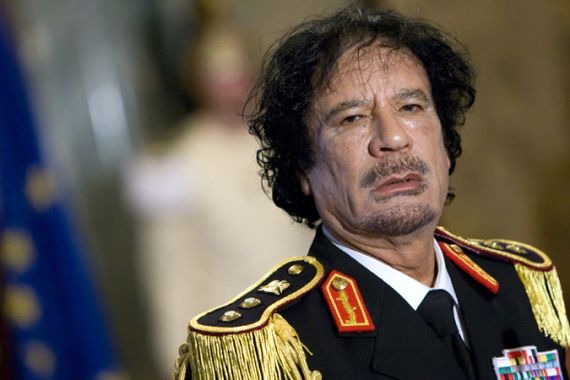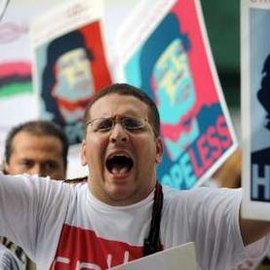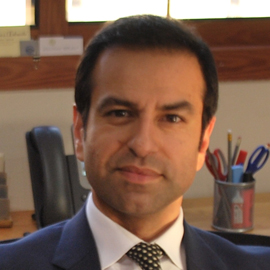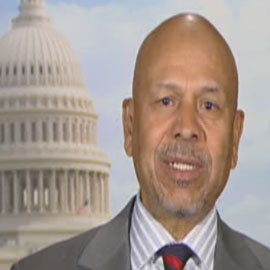Analysis: Reactions to Gaddafi’s death
Analysts, activists, academics and ambassadors share their reactions to the death of the longtime Libyan leader.

 |
| Eight months since the uprising against Gaddafi began, Libyans celebrated the news of the toppled ruler’s death [EPA] |
Uncertainty surrounded initial reports that toppled Libyan ruler Muammar Gaddafi had been killed, and his hometown of Sirte had finally fallen to anti-Gaddafi fighters.
As the news of Gaddafi’s death became clearer, crowds of Libyans took to the streets in Sirte, Tripoli, and Benghazi.
Al Jazeera spoke to analysts, activists, academics and ambassadors about their reactions to Gaddafi’s death. All agree that the event signals a new era for Libya, especially those Libyans who suffered under his rule. However, what will come next for Libya – and the wider region – remains open to debate.
|
Jeremy Keenan |
 |
Jeremy Keenan is a professor of social anthropology at the School of Oriental and African Studies in London and is the author of The Dark Sahara: America’s War on Terror in Africa.
I found out about Gaddafi’s death while I was advising a court hearing on the question of Libyan asylum seekers in the UK. For the first time since February, I was caught by surprise. I never thought that he would actually have holed up in Sirte, because you can’t get out of the place. It’s a trap. It could only end in a shootout. And I think many others agreed. I thought he would probably be in the Sabha region [in Libya’s south] – there he would have access to an escape route to the south. That was my immediate first reaction.
I think many Libyan people would probably have preferred justice to have been done in a court. But that might not be the case; I’m sure you’d get different opinions among Libyans.
Maybe with his death certain questions won’t be answered – such as money, various deals that he did. His sons still might pop up. But it is also questionable whether the sons know all that Gaddafi knew – it would be surprising if they did. Other questions raised are whether Gaddafi’s death will put a damper on any continuing support he has, or whether his death will be portrayed by supporters as martyrdom.
I’m sure [Ali Abdullah] Saleh and [Bashar] al-Assad will find [Gaddafi’s death] slightly disturbing. There’s always the question: Will this happen to us?
The question of why NATO intervened is still not 100 per cent answered. I think if NATO had not intervened, the likelihood of bloodshed in Benghazi was high. There are still huge amounts of problems to surmount.
I was in Bamako recently, where there were huge anti-NATO, pro-Gaddafi rallies. There is a danger that the NATO intervention will be seen as a colonialist, Western intervention. Much will depend on whether other countries, especially Algeria, will play a destabilising role, which Algeria has done lately. [Algerian President Abdelaziz] Bouteflika is extremely ill. Something to bear in mind is that Gaddafi’s death could coincide with the death or replacement of the Algerian president. Don’t turn the cameras off Algeria.
|
Ahmed Addarrat |
 |
Ahmed Addarrat is a second-generation Libyan exile living in the United States. He is a member of the organisation Enough, which is made up of American and European political exiles.
There is overwhelming jubilation [about Gaddafi being killed]. I think it is a collective sigh of relief, because even though much of Libya has been enjoying freedom, there still wasn’t clear-cut freedom until Gaddafi either got captured or killed, because he was still causing a lot of chaos; he still had followers who were responding to his orders. It’s very hard to explain, after 42 years under his rule – and then to see him reduced to a dead corpse in a rat hole.
Words can’t really describe the feeling of Libyans in Libya and those in the diaspora in exile around the world. It’s been a long time coming, but everybody’s happy to see this thing.
I think [a trial] would’ve held the country back a little bit from getting started and rebuilding. A trial would’ve been a bit of a circus. It would’ve been a distraction. We have a country to rebuild and we have a lot of work to do, and I think it’s better that he’s dead and out of the way right now … I think pretty much everybody understood what the outcome of the trial would have been anyway.
[My parents] left Libya in 1979. My dad went to Sudan and Morocco first, and he went all over the place before he settled in America. I just got off the phone with him: tears of joy. All these years he’s been struggling, fighting against this man.
I’m actually going to Libya in a couple of weeks. It’ll be my first time. I’m originally from Misrata, but I’m going to visit Tripoli and Benghazi; we have family all over the place. Gaddafi kept us from our family back in Libya, but we were blessed with another family here [of Libyans who had fled] living abroad.
|
Salman Shaikh |
 |
Salman Shaikh is director of the Brookings Doha Center and fellow at the Saban Center for Middle East Policy. He focuses on mediation and conflict resolution issues facing the Middle East and South Asia. He has held posts at the United Nations and the Office of Her Highness Sheikha Mozah Bint Nasser Al Missned in Qatar.
The death of Muammar Gaddafi is a pleasant surprise. I hate to say it that way, but this is a dictator who has shown that he really was going to fight to the death. It certainly hails the start of a new Libya. And of course it signifies something extraordinary: the fall of three dictators in less than 10 months in North Africa in the context of what is going on in the Middle East. 2011 is an extraordinary year for the region.
The death of Gaddafi will tell other autocrats in the region that their days are numbered. It should tell them that the use of violence and force against their own people can only be effective for so long. There are all different situations, and of course specifically for Bashar al-Assad and Ali Abdullah Saleh, for example, have been using their security forces for quite some time. But at the end of the day, if we do get into a situation where they are not able to reach accommodation with their own people, and the people will not stop, as seems apparent in both Syria and Yemen, things have to change.
Of course this revolution was inspired by Tunisia and Egypt. Many people thought that the Libyans started too early and that they were impatient, which led to the militarisation of the revolution. But frankly, they were facing a dictator and family who were not going to go by any other means than force, and we’ve seen that, even in the final battles. We’ve seen that Ben Ali may be the leader who made the best choice at this point in time.
With the kind of force that Gaddafi was going to use, I think that did merit the Western and Arab intervention that we saw, and whether by design or by accident it’s showed how concerted international action can protect civilians, and how this leads to those people asserting themselves in this kind of situation.
|
Ali Aujali |
 |
Ali Aujali is the Libyan ambassador to the US on behalf of the National Transitional Council.
It is a great day for the Libyans and for the international community to put an end for the dictatorship of Gaddafi’s regime. This is the day of the end of terror, of oppression, and of dictatorship in Libya. Libya now is a free country. Libyans now are free people, and they are looking forward to build a new Libya. It is a great day by all means.
I think we [the US and Libya] share the same feeling, the same celebration. This man [Muammar Gaddafi] hurt not only the Libyans inside Libya, but his criminal act is all over the world. The Americans suffered more than any other nation. I think this is a cheerful day for humanity all over the world, not only in Libya. Leaders who support the democracy and support the struggle of the people for their future, for their destiny to get rid of the brutal regime that have been taking Libya for granted: I think they are all celebrating.
I think what is happening in Libya sends a very strong message to the countries and the dictators still around in the Arab world, that this is the end of dictatorship. And what happened in Libya is sending a strong message. They have to let their people enjoy democracy.
The main thing for me is that he is out. This is a man that only understands the words of revenge. He knows that he is involved in many criminal acts against the Libyans, against the international community, and he knows very well that there is no chance for him to survive. Myself, I always liked to see him dead, instead of captured. If we capture him there are a lot of concerns to come around. This is his end and we are celebrating with the world the end of dictatorship.